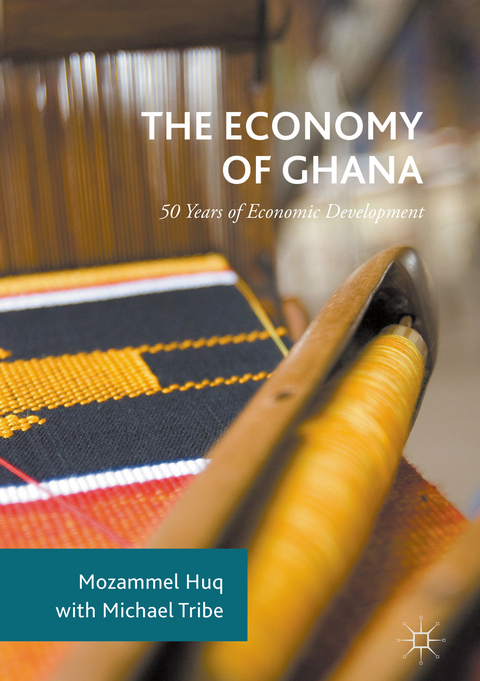
The Economy of Ghana
Palgrave Macmillan (Verlag)
978-1-137-60242-8 (ISBN)
Mozammel Huq is Honorary Senior Lecturer at the University of Strathclyde, UK, and Visiting Professor of Economics at UttarBangla University College (National University Bangladesh), Bangladesh. He has taught development economics for over three decades and published a large number of articles and books, including Development Economics (2009, with A Clunies-Ross and D Forsyth). His association with Ghana has remained close especially since the two-year period (1982-84) that he spent as a Senior Research Fellow at Cape Coast University. Michael Tribe is Honorary Lecturer at the University of Strathclyde, UK. He is a development economist with wide-ranging academic experience and a significant publication record. He previously taught at the University of Bradford, UK, was a Research Fellow in the University of Cape Coast, Ghana between mid-1982 and mid-1984, and was the UK coordinator for a Ghana Development Studies Academic Link between 1990 and 2011.
Part I. Overview.- Chapter 1. A General Overview.- Chapter 2. Policies and Reforms: An Historical Overview.- Part II. The Wider Macroeconomy.- Chapter 3. Growth and Structure of the Economy.- Chapter 4. Achieving Macroeconomic Stability.- Part III. Sectoral Developments.- Chapter 5. Agriculture.- Chapter 6. Cocoa.- Chapter 7. Industry: A Broad Overview.- Chapter 8. Mining.- Chapter 9. Manufacturing.- Chapter 10. The Services Sector.- Part IV. Money and Banking, External Trade and Financial Flows.- Chapter 11. Banking and Finance.- Chapter 12. International Trade.- Chapter 13. External Financial Flows and Debt Relief.- Part V. Infrastructure, Environment and Governance.- Chapter 14. Transport and Communications.- Chapter 15. Energy and Water.- Chapter 16. Education and Health.- Chapter 17. The Environment.- Chapter 18. Governance.- Part VI. Poverty and Income Distribution.- Chapter 19. Poverty and Inequality.- Chapter 20. The State Role in Welfare.- Part VII. Looking Ahead.- Chapter 21.The Way Forward.
| Erscheinungsdatum | 23.05.2018 |
|---|---|
| Zusatzinfo | 5 Illustrations, color; 2 Illustrations, black and white; XXXVIII, 542 p. 7 illus., 5 illus. in color. |
| Verlagsort | Basingstoke |
| Sprache | englisch |
| Maße | 148 x 210 mm |
| Themenwelt | Sozialwissenschaften ► Politik / Verwaltung ► Europäische / Internationale Politik |
| Wirtschaft ► Volkswirtschaftslehre ► Finanzwissenschaft | |
| Wirtschaft ► Volkswirtschaftslehre ► Makroökonomie | |
| Wirtschaft ► Volkswirtschaftslehre ► Wirtschaftspolitik | |
| Schlagworte | African economics • Agricultural Economics • CoCoA • Economic Development • Economic history of Ghana • Economic Recovery Programme (ERP) • Ghanaian Macroconomy • International Monetary Fund (IMF) • Kwame Nkrumah • National Liberation Council • Structural Adjustment Programmes (SAPs) • "Ten-Year Development Plan" • The Economy of Ghana • The Ghanaian Economy • World Bank |
| ISBN-10 | 1-137-60242-2 / 1137602422 |
| ISBN-13 | 978-1-137-60242-8 / 9781137602428 |
| Zustand | Neuware |
| Informationen gemäß Produktsicherheitsverordnung (GPSR) | |
| Haben Sie eine Frage zum Produkt? |
aus dem Bereich


